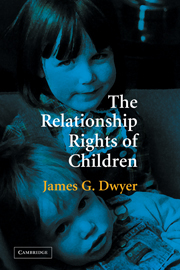Book contents
- Frontmatter
- Contents
- Acknowledgments
- THE RELATIONSHIP RIGHTS OF CHILDREN
- Introduction
- 1 Why Rights for Children?
- 2 The Existing Relationship Rights of Children
- 3 Paradigmatic Relationship Rights
- 4 Why Adults Have the Relationship Rights They Do
- 5 Extending the Theoretical Underpinnings of Relationship Rights to Children
- 6 Rebutting Defenses of the Status Quo
- 7 Implementing Children's Moral Rights in Law
- 8 Applications
- Appendix: The Conceptual Possibility of Children Having Rights
- Notes
- Index
2 - The Existing Relationship Rights of Children
Published online by Cambridge University Press: 23 July 2009
- Frontmatter
- Contents
- Acknowledgments
- THE RELATIONSHIP RIGHTS OF CHILDREN
- Introduction
- 1 Why Rights for Children?
- 2 The Existing Relationship Rights of Children
- 3 Paradigmatic Relationship Rights
- 4 Why Adults Have the Relationship Rights They Do
- 5 Extending the Theoretical Underpinnings of Relationship Rights to Children
- 6 Rebutting Defenses of the Status Quo
- 7 Implementing Children's Moral Rights in Law
- 8 Applications
- Appendix: The Conceptual Possibility of Children Having Rights
- Notes
- Index
Summary
What is the current status of children in the various legal conflicts that arise over their relationships? No simple characterization would accurately capture the current state of the law in any single country, let alone in any collection of countries. It is certainly not true that the law relating to children universally reflects a “best interests of the child” principle, but neither is it true that the law in any western nation entirely disregards the welfare of children. Rather, in every jurisdiction, the law governing decisions about children's relationships on the whole reflects a mix of concerns for interests of children and adults. This chapter provides an overview of the complex reality of children's relationship rights in the West, with a particular focus on the United States and other English-speaking countries. It is fairly comprehensive in terms of topics covered, but does not purport to provide the sort of contextual, in-depth study that comparative legal scholars perform and that might reveal nuances I gloss over. This descriptive chapter is intended just to give some idea of how any normative conclusions might require a reformation of the law in certain jurisdictions.
Some overall assessment might be hazarded. On the whole, the United States appears, among western nations, one of the least protective of children's welfare, in terms of the legal rules it applies to state decision making about children's relationships.
- Type
- Chapter
- Information
- The Relationship Rights of Children , pp. 24 - 67Publisher: Cambridge University PressPrint publication year: 2006



